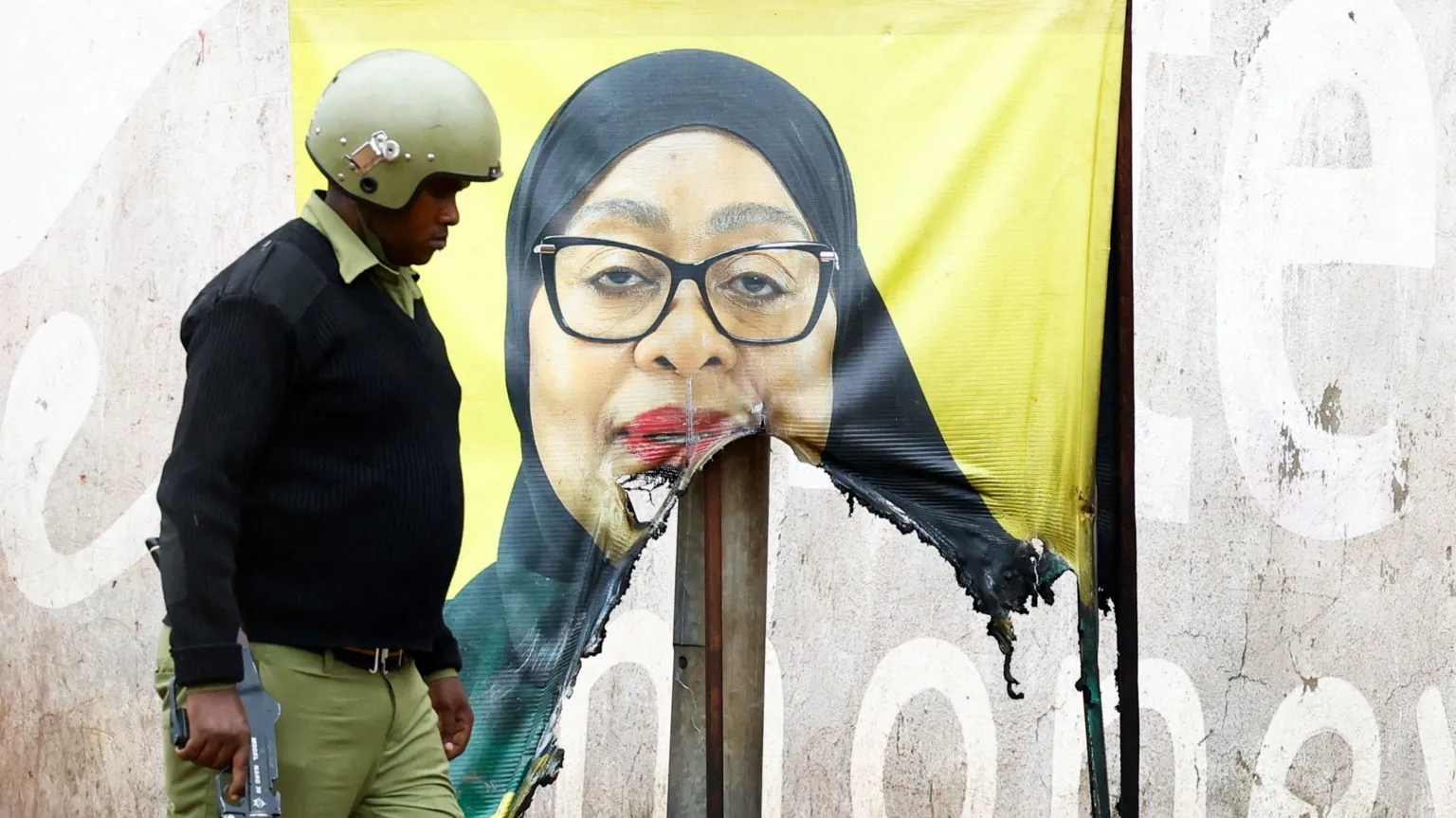Africa
At Least 240 Charged With Treason After Tanzania Election Violence

A Tanzanian court has charged at least 240 people with treason following last week’s deadly election protests.
President Samia Suluhu Hassan was declared the winner of the election with 98% of the vote, but the opposition – which was barred from contesting – denounced the poll as a sham.
Security forces clashed with those protesting against the vote and, according to various sources, hundreds were killed. The authorities have downplayed the scale of the violence and maintained the election was free and fair.
Many people were arrested and have now been charged with treason at a court in the economic capital of Dar es Salaam. They were not been asked to enter a plea in court.
According to a charge sheet seen by the BBC, the defendants are accused of inciting demonstrations with the intention of obstructing the election.
The defendants could receive the death penalty if found guilty. However, in Tanzania, the majority of those sentenced to death eventually have their sentence commuted to life in jail.
The East African nation’s last execution took place in the 1990s.
Among those charged on Friday was prominent Tanzanian businesswoman Jenifer Jovin.
She has been accused of encouraging protesters to buy gas masks in order to protect themselves from the police’s tear gas.
The defendants also include social media influencers. The court has been adjourned until 19 November.
During her inauguration speech, President Samia condemned the violence and also blamed foreigners for stoking the unrest.
It has left many Kenyans in Tanzania fearful for their safety after being reportedly targeted in the brutal crackdown – and has prompted Kenya’s Foreign Minister Musalia Mudavadi to ask his Tanzanian counterpart that their safety be guaranteed.
During a phone conversation, Mudavadi said he had told his Tanzanian Foreign Minister Mahmoud Thabit Kombo that concerns would be “addressed through the established diplomatic and consular channels”.
But he reaffirmed “the importance of safeguarding the rights, safety, and dignity” of Kenyans living in Tanzania.
In May, Mudavadi had said that about 250,000 Kenyans lived, worked or did business in Tanzania.
Earlier a Tanzanian police spokesman said the country had intelligence that some foreigners had crossed the border through illegal points “with the intention to commit crimes, including causing unrest”.
Several families in Kenya have expressed concern for the safety of their relatives in Tanzania, following reports that some Kenyans have been killed, injured, or detained, while others are nursing injuries allegedly inflicted by Tanzanian security officers.
John Ogutu, a Kenyan teacher working in Dar es Salaam, was shot dead by police while on his way to buy food, his older sister told the BBC.
But rights groups say his body can not be traced for repatriation and burial.
On Tuesday, a doctor at Muhimbili Hospital in Dar es Salaam told the BBC that vehicles marked “Municipal Burial Services” had been collecting bodies of those believed to have died in the protests.
Kenya’s foreign affairs ministry has now asked relatives of Kenyans who may be in distress in Tanzania to share their names, addresses and emergency contacts.
Reports say many Kenyans, especially those working in private schools, are now fleeing Tanzania after the government warned employers not to engage people without work permits.
Election observers say the polls fell short of democratic standards, but the government insists the election was fair and transparent.
President Samia faced little opposition with key rival candidates either imprisoned or barred from running.
Her inauguration ceremony was held at a military parade ground in the capital, Dodoma, instead of a stadium as in previous years. It was closed to the public but was shown live on state TV.
She initially came into office in 2021 as Tanzania’s first female president following the death of President John Magufuli – and was initially praised for easing political repression, but the political space has since narrowed.
Tanzania and Kenya, which are both part of the Economic African Community, have experienced periodic political and economic tensions.
In May diplomatic relations were strained over Tanzania’s treatment of Kenyans who had gone to Dar es Salaam to observe the treason trial of opposition leader Tundu Lissu.
Several of them were deported while prominent Kenyan activist Boniface Mwangi, along with Ugandan activist Agather Atuhaire, went missing and were later reported to have been tortured and sexually mistreated.
Kenya Insights allows guest blogging, if you want to be published on Kenya’s most authoritative and accurate blog, have an expose, news TIPS, story angles, human interest stories, drop us an email on [email protected] or via Telegram
-

 Grapevine2 weeks ago
Grapevine2 weeks agoAlleged Male Lover Claims His Life Is in Danger, Leaks Screenshots and Private Videos Linking SportPesa CEO Ronald Karauri
-

 Grapevine1 week ago
Grapevine1 week agoRussian Man’s Secret Sex Recordings Ignite Fury as Questions Mount Over Consent and Easy Pick-Ups in Nairobi
-

 Investigations6 days ago
Investigations6 days agoMulti-Million Dollar Fraud: Three Kenyans Face US Extradition in Massive Cybercrime Conspiracy
-

 News4 days ago
News4 days agoTHE FIRM IN THE DOCK: How Kaplan and Stratton Became the Most Scrutinised Law Firm in Kenya
-

 Economy5 days ago
Economy5 days agoIran Demands Arrest, Prosecution Of Kenya’s Cup of Joe Director Director Over Sh2.6 Billion Tea Fraud
-

 Business6 days ago
Business6 days agoA Farm in Kenya’s Rift Valley Ignites a National Reckoning With Israeli Investment
-

 Africa1 week ago
Africa1 week agoFBI Investigates Congresswoman Ilhan Omar’s Husband’s Sh3.8 Billion Businesses in Kenya, Somalia and Dubai
-

 Business2 weeks ago
Business2 weeks agoM-Gas Pursues Carbon Credit Billions as Koko Networks Wreckage Exposes Market’s Dark Underbelly















